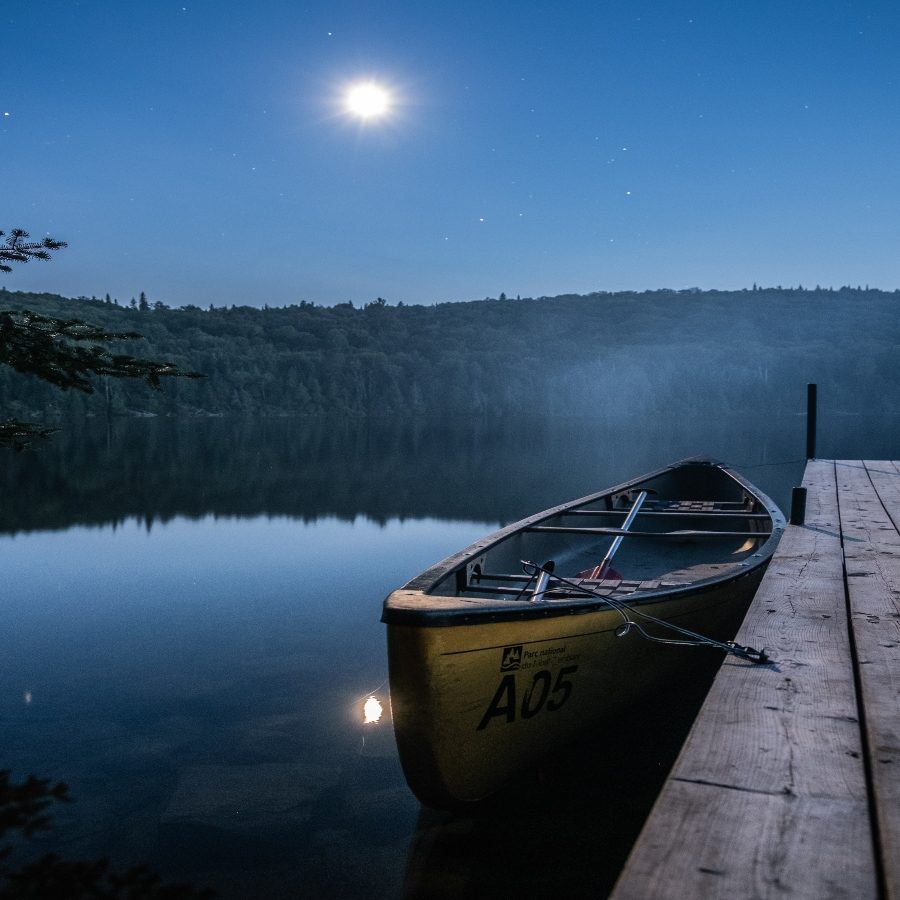
A Nice Blue Place
Our father knows all about fishing, but he doesn’t do it anymore. He doesn’t do a lot of things anymore. He used to be real good. About once a year when we were young, he used to drive his old red station wagon all the way down to Kentucky to fish in a competition. Sometimes he’d come back with a trophy or a ribbon, but one time he came back with nothing—just bulging veins, and eyes like an owl. Our mother didn’t speak to him again then for months, and the times she did her voice was soft and raw. He didn’t drive back down after that.
It is fall.
Each night our father walks to the edge of the property. Our father often goes out there to sit and look at the lake. He says, it’s calm out there. He says, he goes out there to get to a nice blue place. We don’t know what he’s talking about. Our mother hates it when he talks like this. She says, our father’s full of it. She says, why oh why does it have to be like this?
One night, we go outside to find our father. He’s not in his usual spot. We walk around, calling his name. Soon we find him on his back in the dirt. We get up real close. Blood pushes thick along his veins, and every once in a while he coughs and rolls over. We sit with our father, watching his breath roll, until the sun goes down and our mother’s calling us inside.
So we listen, go inside, say our prayers, get to bed. Kidding. We don’t do anything like that. We don’t even think anything like that. Instead, we stay with our father.
Our father wakes, spits dirt out of his mouth.
The thin evening light begins to empty across the yard. In the light, he doesn’t resemble our father at all—his features stretched, worn.
He says, let’s go fishing. Our hearts. Our hearts. The joy shooting through our limbs. Punching holes in our chests. None of us move. Breathe. It’s all we’ve ever wanted.
He takes us out on the boat, helps us bait our lines. He guides our hands, and shows us how to cast. We sit and wait. We reel in our worms and cast them out again. Our legs start twitching and moving. We don’t want to wait, but our father says the waiting is the best part. He says, it’s even better than catching a fish, but we think it’s probably just another thing he says. He says, your mind gets to a nice blue place and you can think about a lot of different things—how there’s things you can’t even see swimming in the water along with the fish. Organisms. And how smaller than that there are more things, harder to see.
“How do you know they are there if you can’t see them?” we ask.
“I don’t know,” our father says. “Just do.”
We spot a fish then, gliding under the water. A big dark shape—a blackish non-space against the blue glow of dusk. Pike, we’re told. Its fins thrust gently against the water on either side, propelling it forward. Each stroke shatters the lake’s soft mirror of light. The dark shape bobs under the water. All course and scaly edges. Eyes like hard black gleaming marbles. It nips suddenly at the dangling worm and our line goes tight. We cry out and it begins to swim away, zipping off into the dark of the water. Pull, our father says, pull! But we don’t listen. The line keeps feeding out and gets tangled somehow in the water below. All of us shift forward to see it. The next thing we know the boat has tipped over. We are in the lake. Cold water rushes up and all around us. We thrash and gasp. Sharp motors of elbows and knees churn in the murky water; it stings our eyes and fills our throats and noses, and when we press our eyes shut tight there are gentle floaters clicking about that look like tiny, neon skeletons.
We feel a sweep around us and then we’re back out of the water. Our father holds us in his arms, pulls us to solid ground. We are soaked and our clothes are heavy. Our shoes are missing. The grass is cold and mushy around our toes. Everything is still.
When we turn, the boat is gone. The poles and everything gone. All gone.
We huddle together, hide inside the warmth of our bodies. We tell each other we love each other; it’s all we can think to say in this moment: this love we have for one another, and the possibility of this love—of any love—having an end is too painful to hold inside our heads.
The sky changes. It isn’t dark or light—something in between.
We sit on the shore until our mother finds us. She doesn’t say anything, sits right down. Together we cup our hands and lower them into the water, bring it to our faces.
We don’t think about the things of that water.
We don’t think about the things we cannot see.
We think about the freshness of that water, and the chill that it leaves.
David Byron Queen grew up in Ohio. His work has appeared in Vol. 1 Brooklyn, The Rumpus, VICE, Hobart, McSweeney’s, Split Lip Magazine, New South, and elsewhere. He has an MFA in Fiction from the University of Montana, where he was a Truman Capote Fellow. Currently, he lives in Brooklyn, New York and runs the indie publishing company ‘word west.’
Submit Your Stories
Always free. Always open. Professional rates.
